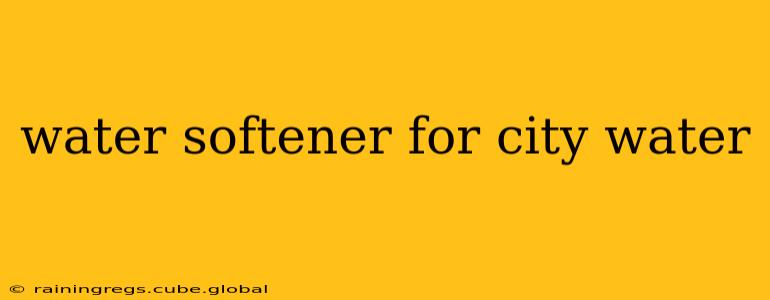Many homeowners assume that city water is automatically soft and pure. However, this isn't always the case. While city water undergoes treatment processes to remove harmful contaminants, it often still contains significant levels of minerals like calcium and magnesium, which can lead to hard water problems. This comprehensive guide explores whether you need a water softener for your city water, addressing common concerns and offering insightful advice.
What are the signs of hard water?
Hard water, regardless of its source, manifests in several ways. Identifying these signs is the first step in determining if a water softener is necessary for your home. Look out for:
- Scale buildup: White, chalky deposits on faucets, showerheads, and appliances. This mineral buildup restricts water flow and reduces the efficiency of your appliances.
- Soap scum: Difficulty lathering soap, leaving behind a residue on skin and surfaces.
- Dry, itchy skin and hair: Hard water can strip natural oils, leading to dryness and irritation.
- Spotting on dishes and glassware: Even after washing, water spots remain, indicating high mineral content.
- Clogged pipes and appliances: Mineral buildup can eventually clog pipes and reduce the lifespan of water-using appliances like dishwashers and washing machines.
Does my city water really need softening?
The hardness of your city water varies significantly depending on your location and the source of the water supply. Some municipalities have naturally soft water, while others struggle with high mineral content. The best way to determine the hardness of your water is to:
- Check your water report: Your city's water quality report, often available online, will typically list the hardness level in grains per gallon (gpg) or milligrams per liter (mg/l). Generally, anything above 7 gpg is considered hard water, while above 11 gpg is very hard.
- Conduct a home water test: Several affordable home water testing kits are available at most home improvement stores. These kits provide a quick and easy way to assess your water's hardness.
- Contact your water supplier: They can provide information about your water's hardness and any other relevant water quality parameters.
What are the benefits of using a water softener?
Investing in a water softener offers several compelling benefits beyond simply improving water quality:
- Extended appliance lifespan: Reduced scale buildup protects your appliances, extending their lifespan and saving you money on repairs or replacements.
- Improved laundry results: Softer water allows detergents to work more effectively, resulting in cleaner clothes and brighter colors.
- Healthier skin and hair: Softer water is gentler on skin and hair, leaving them feeling softer and less irritated.
- Enhanced cleaning efficiency: Soap and detergents lather better, requiring less product and reducing environmental impact.
- Better taste and smell: Hard water minerals can sometimes impart an unpleasant taste or odor to water. A softener can help eliminate these issues.
What type of water softener is best for city water?
Several types of water softeners are available, each with its own advantages and disadvantages. The most common types are:
- Ion exchange softeners: These are the most popular type, using a resin bed to exchange hard water minerals with sodium ions. They are highly effective but require regular salt replenishment.
- Salt-free water conditioners: These devices use different methods to reduce scale buildup without using salt. However, they may not be as effective as ion exchange softeners at completely eliminating hardness minerals.
The best type of water softener will depend on your specific needs, budget, and water conditions. Consulting a water treatment specialist can help you determine the most suitable option for your home.
What is the cost of a water softener for city water?
The cost of a water softener varies considerably depending on factors such as size, features, and brand. Generally, you can expect to pay anywhere from a few hundred dollars to several thousand dollars for a whole-house system. Installation costs should also be factored into the total budget.
How do I maintain a water softener?
Proper maintenance is crucial to ensure your water softener continues to function efficiently. This typically involves:
- Regular salt replenishment: Ion exchange softeners require regular additions of salt to regenerate the resin bed.
- Periodic flushing: Regular flushing helps remove any accumulated sediment or debris.
- Professional servicing: Annual or biannual professional servicing is recommended to ensure optimal performance and identify potential issues early.
By understanding the signs of hard water, assessing your water quality, and considering the various types and costs of water softeners, you can make an informed decision about whether a water softener is the right solution for your home's city water supply. Remember that consulting a water treatment professional can provide personalized guidance and ensure you select the most appropriate system for your specific needs.
